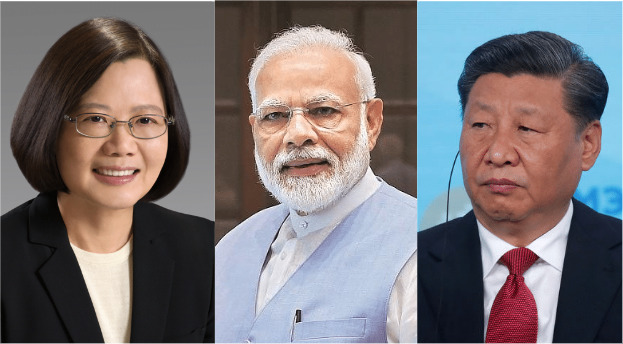Amidst the COVID-19 Pandemic, Beijing is feeling the heat on the issue of Taiwan with countries across the world forging close ties with the little island amidst hostile political atmosphere against the People’s Republic of China. The biggest casualty for China is thus turning out to be its ‘One China’ Policy vis-a-vis Taiwan.
The latest blow for Beijing has come from New Delhi, which is reportedly looking to curb unbridled access to the Indian markets by China and is, therefore, contemplating options including mandating the “approval route” for Chinese Foreign Portfolio Investment (FPI). According to TOI, the new FPI guidelines will apply to the whole of China but will exempt the Taiwanese investors.
Earlier, India had tightened the Foreign Direct Investment (FDI) norms for its neighbouring countries in a bid to avoid hostile Chinese takeovers. Excluding the Taiwanese investors means that the Modi government has decided to treat the average Taiwanese citizen differently from a mainland Chinese citizen. This is for the first time that India is going to denounce Beijing’s ‘One China’ policy at a time when Beijing is already finding it hard to avoid worldwide sympathy for the Taiwanese cause.
Recently, Taiwan had also donated 1 million masks for medical personnel on the front-lines in India, and at the same time it has also sought India’s help ahead of a key WHO meeting later this month. India is set to take charge of the Executive Body at WHO that implements World Health Assembly’s decisions and Taiwan is banking on New Delhi’s support.
The pro-independence Tsai Ing-wen regime in Taiwan has been able to tilt global opinion in its favour during the ongoing public health emergency, because while China covered up the Pandemic and slipped the whole world into a crisis with its faulty medical supplies, Taiwan has been helping out other parts of the world with its promising containment model and effective medical supplies. This is also why there is a vocal demand to make the island a WHO member.
Last month, the President of the European Commission which is the European Union’s executive arm, Ursula von der Leyen had taken to Twitter to thank Taiwan after it donated 5.6 million masks to the EU in the battle against the Wuhan virus.
This was significant as the EU has often titled towards Beijing with Italy being one of the first countries to participate in China’s Belt and Road Initiative. Rarely does the 27-bloc EU support or appreciate Taiwan.
Leyen had tweeted, “The European Union thanks Taiwan for its donation of 5.6 million masks to help fight the #coronavirus. We appreciate this gesture of solidarity. This global virus outbreak requires international solidarity & cooperation.”
With EU tilting towards Taiwan, it became clear for Beijing that China’s murky role in the COVID-19 crisis would alter geopolitical dynamics when it comes to the ‘One China’ Policy regarding Taiwan.
The next jolt, of course, came from the United States after President Donald Trump signed the TAIPEI Act to support Taiwan’s international relations. More importantly, the bill had received bipartisan support as it had been unanimously passed by both the house of Representatives and the Senate.
Taiwan itself is feeling emboldened like never before, and now there are growing calls in Taiwan to amend or entirely draft a new constitution to reflect the present-day scenario and erase the mention of China from Taiwan’s constitution.
Within India, there were already signs of sympathy for the Taiwanese cause that rattled China. Around the world, the Chinese Ambassadors have a history of harassing local media outlets- Beijing believes that every media outlet in the world should be as spineless as the Chinese State media and must toe CCP’s official line.
Therefore, Beijing was rattled when the Indian media outlets started picking up Taiwan’s cause. Till now, China has objected to three Indian media outlets, viz. WION News, Times of India and The Hindu, after they gave space to Taiwanese voices.
Beijing, which is rattled by the mention of Taiwan, especially when it comes to WION news’ aggressive coverage of the Coronavirus Pandemic, has been continuously threatening the Indian media machinery against not adhering to Beijing’s ‘One China’ Policy.
Recently, China’s PLA soldiers engaged in face-offs and clashes with the Indian Army troops at the disputed Indo-China border in Sikkim and Eastern Ladakh- the sudden flare-ups taking place days before India’s turn to take charge of the World Health Organisation (WHO) Executive Body. Beijing fears that India might speak up for Taiwan’s membership at the WHO and thus decided to heat up matters along the LAC.
The Chinese Embassy Spokesperson, Jo Rong has himself spoken in language unbecoming of a diplomat. While denying any possibility of WHO membership to Taiwan, he tweeted, “We urge relevant Indian media take a correct stance on this issue & adhere to the One-China principle, a widely accepted universal consensus of the international community including the Indian government.”
We urge relevant Indian media take a correct stance on this issue & adhere to the One-China principle, a widely accepted universal consensus of the international community including the Indian government. (4/4)
— Wang Xiaojian (@ChinaSpox_India) May 11, 2020
Beijing has been continuously pressuring the Indian media to stick to the ‘One China’ policy, but it is in for a big shock. The Modi government itself might not adhere to the totalitarian and repressive principle as seriously as Beijing wants. By exempting Taiwanese investors from the new FPI guidelines against China, New Delhi is bound to irk the Dragon like never before.
